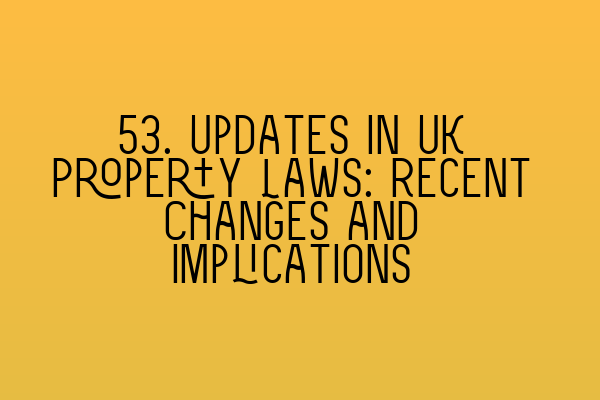53. Updates in UK Property Laws: Recent Changes and Implications
At SQE Property Law & Land Law, we understand the importance of staying up to date with the latest developments in property law. As a solicitor, it is crucial to have a comprehensive understanding of the constantly evolving legal landscape in order to provide the best advice and services to our clients. In this blog post, we will discuss some of the recent updates in UK property laws and their implications.
1. Stamp Duty Land Tax Changes
One of the most significant recent changes in UK property laws is the stamp duty land tax (SDLT) holiday. The SDLT holiday was introduced by the government in response to the COVID-19 pandemic to stimulate the property market. Under the temporary measures, a temporary increase in the threshold for residential SDLT was implemented, resulting in significant savings for homebuyers.
The implications of this change are twofold. Firstly, it has created a surge in property transactions, as buyers rush to take advantage of the reduced SDLT rates. This has led to increased demand in the housing market and potentially higher property prices. Secondly, the SDLT holiday has provided an opportunity for first-time buyers and those looking to move up the property ladder to save on their property purchases.
2. Leasehold Reform
Another important development in UK property laws is the government’s commitment to leasehold reform. Leasehold properties have long been a topic of controversy due to issues such as ground rent escalation, unfair lease terms, and complications related to lease extensions and enfranchisement.
The reforms proposed by the government aim to provide greater transparency and fairness for leaseholders. Key proposals include the extension of leasehold to commonhold conversions, restrictions on ground rent charges, and simplification of the lease extension and enfranchisement process.
These changes have significant implications for property owners, developers, and investors. It is important for solicitors to stay informed about the evolving leasehold reform landscape to effectively advise their clients and ensure compliance with the new regulations.
3. Energy Efficiency Regulations
In line with the UK government’s commitment to reducing carbon emissions and tackling climate change, there have been updates to energy efficiency regulations for residential and commercial properties.
The Minimum Energy Efficiency Standards (MEES) were introduced as part of a wider effort to improve the energy efficiency of buildings. These regulations set a minimum energy performance certificate (EPC) rating that properties must meet before they can be let or sold.
Recent changes to MEES regulations include a tightening of the minimum EPC rating requirements for residential properties. From April 2025, residential properties will need to have a minimum EPC rating of C in order to be rented out.
These updates have implications for landlords, tenants, and property developers. It is important for solicitors to ensure that their clients are aware of and compliant with the energy efficiency regulations, as non-compliance can result in financial penalties and limitations on property transactions.
4. Impact of Brexit
The United Kingdom’s withdrawal from the European Union, commonly known as Brexit, has also had implications for UK property laws. While many property laws have remained unchanged, there have been some notable changes, particularly in relation to cross-border transactions and EU citizens’ rights to own and reside in UK properties.
Solicitors must stay up to date with any changes in legislation or regulations that may impact their clients in light of Brexit. Understanding the potential implications of Brexit on property transactions and providing accurate advice to clients is essential.
Conclusion
Staying updated with the latest developments in UK property laws is crucial for solicitors at SQE Property Law & Land Law. The recent changes discussed in this blog post, including the stamp duty holiday, leasehold reform, energy efficiency regulations, and the impact of Brexit, have significant implications for property owners, developers, and investors.
By staying informed and continuously expanding our knowledge, we can provide the best possible legal services to our clients. If you would like to learn more about SQE preparation courses or upcoming SRA SQE exam dates, please check out our related articles:
– SQE 1 Practice Exam Questions
– SQE 1 Practice Mocks FLK1 FLK2
– SQE 2 Preparation Courses
– SQE 1 Preparation Courses
– SRA SQE Exam Dates
We are committed to providing the highest level of expertise and guidance to our clients in navigating the complex world of property law. If you have any queries or require legal assistance, please do not hesitate to contact us at SQE Property Law & Land Law.
